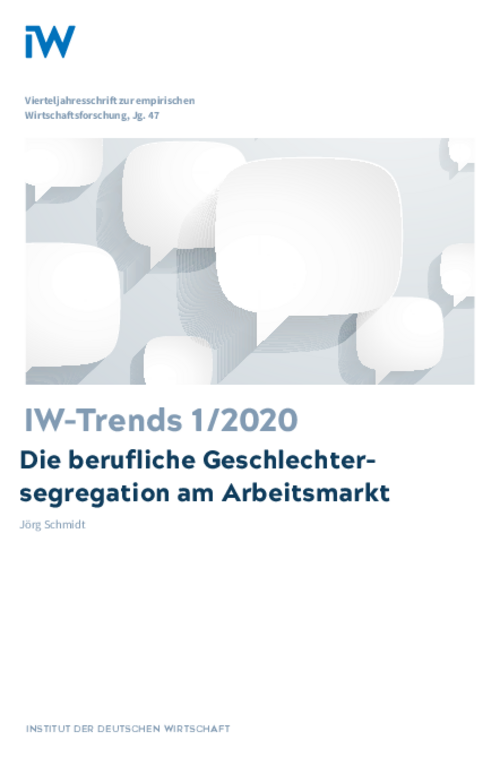Personal Preferences Play? Gender segregation in the German labor market has proved to follow a relatively consistent pattern over time. With few exceptions, there have in recent years been only minor changes in the gender composition of individual occupational groups.

Occupational Gender Segregation in the Labor Market: Which Role Do Personal Preferences Play?
IW-Trends

Personal Preferences Play? Gender segregation in the German labor market has proved to follow a relatively consistent pattern over time. With few exceptions, there have in recent years been only minor changes in the gender composition of individual occupational groups.
The causes of this extensive occupational segregation are to be found in a variety of factors that are virtually impossible to capture completely with empirical methods. For this reason, the present study is limited to an analysis of the links between certain personal preferences and the gender typology of occupational groups. Based on data from the Socio-Economic Panel for the year 2016, it can be shown that women and men for whom material preferences ("be able to afford something") are important or very important have an increased tendency to work in mixed or male-typical occupational groups rather than in those typical for women. In addition, there is evidence that men with very pronounced altruistic preferences ("be there for others") are more likely to work in occupations typically held by women. Moreover, the aspect of self-realisation in general seems to be a more important factor for female-typical occupations. The results also suggest that the gender distribution among different occupational groups occurring at the time of the original career choice tends to be weakened by occupational changes during the working life. Even if these findings can ultimately only indicate trends and show that further research is needed, they deserve consideration when discussing gender-specific labour market outcomes, particularly, for example, with regard to the gender pay gap.

Jörg Schmidt: Die berufliche Geschlechtersegregation am Arbeitsmarkt – Welche Rolle spielen persönliche Präferenzen?
IW-Trends

More on the topic

Leadership in transformation: Megatrends and management as a driver of change
Leadership dynamics in companies are subject to constant change in order to meet the challenges of their time. Today, the greatest influences result from developments such as demographic change, globalization, individualization, structural change and ...
IW
Orphaned executive chairs in German companies
In 2023, half of the companies in Germany reported increasing problems in filling vacancies for management positions because employees are not aiming for a career. Larger companies are less affected than small companies.
IW